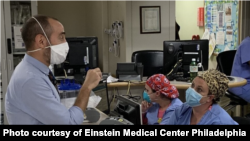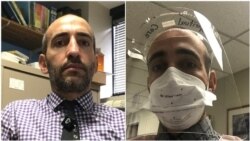Beyond the physical burdens of COVID-19, the disease can impose an emotional and spiritual weight on patients. It extends to their loved ones and to the health workers who treat them.
Matthew Arlyck is staff chaplain at Einstein Medical Center Philadelphia in the eastern U.S. state of Pennsylvania. Ordained as a Presbyterian minister in January 2019, he joined the center three months later. Now 44, Arlyck says the pandemic has challenged his ability to provide hands-on solace and comfort. Physical contact and nuanced facial expression have been key tools of chaplaincy, he explained in a Zoom interview.
The interview has been edited for length and clarity.
MATTHEW ARLYCK: I'm so used to the experience of providing support to people who are in grief and trauma as such a tactile and physical one. I rely so much on nonverbal communication, on people being able to read my face, but also for me to be able to read theirs. And so, it's harder to have an experience of your impact on people, because I go into a patient's room who’s COVID positive, then wearing a gown and gloves. And if I'm going to be close to them, literally at the bedside, then I also would be wearing a face shield. And so, even though I'm wearing a mask, my eyes become that much more important in terms of what they convey. I can still gesture with my hands.
VOA: I understand that the hospital chaplain’s work isn't only with patients but also with the staff.
Absolutely. That happens both on a very informal basis where we just are talking to staff and just checking in with them and seeing how they're doing, to much more programmatic efforts of having call-in times for prayer, for mindfulness and moments to show appreciation for staff. But it's an ongoing challenge, because staff are very busy and don't necessarily feel comfortable opening up about how they're feeling.
Are you able to level with each other about these difficulties?
Oh, yeah. A big part of connecting with them is empathizing and being able to be vulnerable and being able to share a little bit about my own experience.
Help me understand why religion and spirituality belong in a hospital.
I believe that we are all spiritual beings, in that we are all in the process of making meaning. And it's been very challenging in this time of COVID for people to make meaning of this experience, because it's unprecedented, and it's a particularly unsettling time. For some people, their beliefs get validated. For others, it really shakes those beliefs to their core.
What my experience has been and what I hear people talking about is the interconnectedness, both in ways that are beautiful and kind of emotionally supportive, but also in the ways in which our interconnectedness is also what right now is dangerous.
In our hospital, we've had couples that have died, people who have lived together for their whole adult lives. And because of that closeness that they have, have infected each other and have died because of that closeness.
You mentioned the beauty of interconnection, as well. What about for you?
I've connected with all kinds of staff who I never had before. Clerks, people who work in registration, janitorial staff. I think there's a sense in which we really are all in this together. And I find that people are responding so much more honestly when we're all struggling so much.
This is exactly what you signed up for as a hospital chaplain, isn't it?
Yeah. This is what I feel like I was called to do. And I'm so grateful that I've been put in this place at this time.
Now, you’re an ordained Presbyterian minister. How does your own personal faith and theology figure into your work during the COVID era?
A big part of my Christian faith has to do with a very particular kind of hope that I think is sort of unique to Christianity in that its sort of irrational, almost foolish hope in God's ability to break through in a world that can feel utterly dark.
And it really feels very distinct from optimism, because personally, I find it pretty difficult to be optimistic in the world that we live in. But I'm always hopeful. And I think that that really comes from that sense that God can do the impossible. And that's kind of manifested in Jesus' life and in Jesus’ death and resurrection.
Are you saying there's some sort of golden message hidden in this catastrophe?
I'm careful not to say that this is happening for a good reason, but I do think that there is always a seed of transformation, even in the worst trauma, the worst oppression and the worst kind of evil, whether it's human-made or whether it's a disease.
This report originated with VOA’s English to Africa service.





